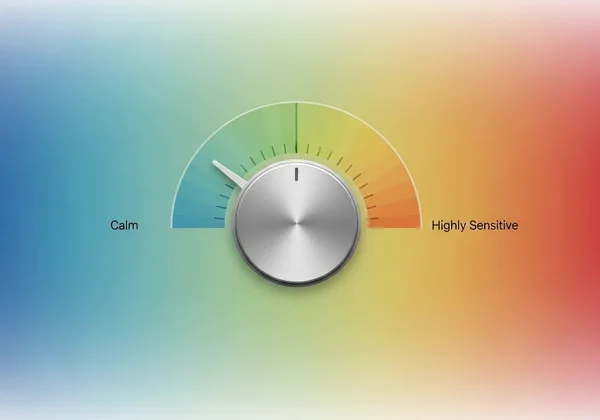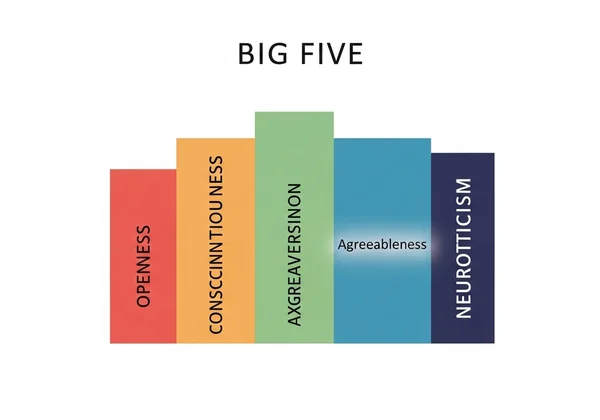What is Neuroticism? Understand Emotional Stability & Traits
August 4, 2025 | By Alicia Campos
Ever feel like your emotions are on a rollercoaster, or find yourself dwelling on worries more than others? You're not alone. This guide is here to demystify neuroticism, a fundamental personality trait that profoundly influences our emotional world. So, what is neuroticism? It's a key dimension of personality characterized by the tendency to experience negative emotions like anxiety, anger, guilt, and depression. We'll explore its definition, how it fits into your overall personality, and what it means for your daily life, offering a clear path to self-understanding.
Understanding where you fall on the emotional stability spectrum is the first step toward personal growth. It can help you navigate challenges with greater awareness and resilience. If you're curious to see how these traits apply to you, you can discover your personal traits with a structured assessment. This journey of self-discovery empowers you to harness your strengths and manage your emotional responses more effectively.

What is Neuroticism? Defining This Core Personality Trait
Neuroticism is one of the core personality traits in modern psychology. It represents an individual's tendency to be in a negative or anxious emotional state. Think of it as a dial for emotional sensitivity. People with higher neuroticism tend to react more intensely to stressors and are more likely to interpret ordinary situations as threatening and minor frustrations as hopelessly difficult.
This trait isn't about being "good" or "bad"; it's a natural variation in human personality. It influences how we perceive the world, cope with stress, and regulate our feelings. Understanding this trait is crucial because it sheds light on why we feel and behave the way we do. A greater awareness can lead to better strategies for managing life's ups and downs. The best way to begin this is often with an online assessment that addresses anxiety and emotional patterns.
Is Neuroticism Just Anxiety? Clarifying the Distinction
A common question is, "Am I neurotic or just anxious?" While neuroticism and anxiety are closely related, they are not the same. Neuroticism is a broad personality trait that encompasses a predisposition to experience a range of negative emotions, including but not limited to anxiety. Others include moodiness, jealousy, envy, and frustration. Anxiety, on the other hand, is a specific emotional response often characterized by feelings of tension, worried thoughts, and physical changes.
Think of neuroticism as the fertile ground where seeds of anxiety, sadness, or irritability can more easily grow. A person high in neuroticism is more vulnerable to feeling anxious, but the trait itself is wider in scope. A clinical anxiety disorder is a diagnosable condition, whereas neuroticism is a dimension of normal personality. An assessment can help clarify your personal tendencies.

Key Characteristics and Signs of Neuroticism
How does a neurotic person behave? Individuals with higher levels of neuroticism often display a set of recognizable characteristics. They may worry excessively about various things, from work deadlines to social interactions. They are also prone to experiencing frequent mood swings and can be perceived by others as irritable or overly sensitive.
Other common signs include:
- High Self-Consciousness: A tendency to feel easily embarrassed or socially anxious.
- Difficulty with Stress: Finding it hard to cope with pressure and bouncing back from setbacks.
- Pessimism: Focusing on the negative aspects of a situation rather than the positive.
- Feelings of Guilt or Sadness: Dwelling on past mistakes or feeling down without a clear reason.
Recognizing these signs in yourself is not a cause for alarm, but an opportunity for insight. An accurate neuroticism assessment provides a structured way to evaluate these patterns.
Neuroticism's Place in the Big Five Personality Model
To truly grasp neuroticism, it's helpful to see where it fits within the larger map of human personality. The most widely accepted framework among psychologists is the "Big Five" model. This theory posits that personality can be described along five broad dimensions: Openness, Conscientiousness, Extraversion, Agreeableness, and Neuroticism. A big five neuroticism test specifically measures this crucial trait.
Each of these traits exists on a spectrum, and every individual has a unique combination that makes up their personality profile. Neuroticism is the dimension that captures differences in emotional stability and the tendency to experience negative affect. It stands opposite emotional stability, providing a clear framework for understanding our inner emotional landscape.

The Role of Emotional Stability within the Big Five Traits
Within the Big Five model, neuroticism is often discussed in terms of its opposite pole: emotional stability. If someone scores high on neuroticism, they score low on emotional stability, and vice versa. Emotional stability is characterized by calmness, resilience, and emotional control. Individuals with high emotional stability are typically even-tempered, relaxed, and able to face stressful situations without becoming overly upset.
Therefore, when you take an emotional stability test, you are essentially measuring your level of neuroticism. The two concepts are two sides of the same coin. Understanding this relationship helps contextualize your score, showing you not just your tendencies toward negative emotions but also your capacity for resilience and calm.
The Spectrum of Neuroticism: High vs. Low Scores Explained
It's important to remember that neuroticism is not a binary switch—it's a spectrum. Everyone falls somewhere on the scale from very low to very high. There are both challenges and potential strengths associated with different points on this spectrum. Learning where you stand can provide valuable insights for personal and professional development.
Whether you lean towards a high or low score, self-awareness is the key. A scientifically-backed test for neuroticism can give you a precise understanding of your unique emotional makeup, empowering you to navigate life more effectively. It’s not about changing who you are, but about understanding how you operate.

What Does a High Neuroticism Score Mean for You?
So, what does a high neuroticism score mean? A high score suggests a greater sensitivity to stress and negative emotions. You might find that you worry more than others, are more prone to feeling anxious or sad, and react more strongly to life's challenges. In a professional setting, this could mean you are more cautious and thorough, as you anticipate potential problems. In relationships, it might make you more attuned to your partner's feelings, though also more susceptible to jealousy or insecurity.
While this sensitivity can be challenging, it's not without its advantages. People high in neuroticism are often highly self-aware, thoughtful, and motivated to avoid danger or failure. The key is to channel this sensitivity constructively. A high neuroticism test result is a call to develop robust coping mechanisms and stress management techniques.
Understanding Low Neuroticism: Traits of Calmness and Resilience
On the other end of the spectrum is a low neuroticism score. This indicates a high degree of emotional stability. Individuals with low neuroticism are generally calm, secure, and resilient. They don't get rattled easily and can handle stress without becoming overwhelmed. They tend to be free from persistent negative feelings and are generally satisfied with their lives.
While this sounds ideal, every trait has its trade-offs. Someone with very low neuroticism might sometimes be less motivated by a sense of urgency or may underestimate potential risks. However, their ability to remain level-headed is a significant asset in many situations, especially in leadership roles or high-pressure environments. Curious about your resilience? An online assessment can help you discover your score.
Knowing Yourself: Your Path to Greater Emotional Well-being
Understanding neuroticism is about more than just labeling yourself. It's about gaining the self-knowledge needed to navigate your emotional world with confidence and grace. Whether you score high, low, or somewhere in the middle, this awareness empowers you to leverage your strengths and work on your challenges. It’s the foundation for building stronger relationships, excelling in your career, and achieving greater overall well-being.
Your personality is a core part of who you are, and exploring it is a journey worth taking. If you're ready to take the next step toward deeper self-understanding, the best way is through a reliable assessment. Start your free neuroticism test today and receive instant insights into your emotional profile, along with an optional, AI-powered report for actionable advice.
Frequently Asked Questions About Neuroticism
What is a neuroticism test, and why is it useful?
A neuroticism test is a psychological assessment designed to measure where you fall on the spectrum of emotional stability versus neuroticism. It typically involves a series of questions about your feelings, behaviors, and reactions to various situations. It's incredibly useful because it provides objective, data-driven insight into your personality, helping you understand your emotional patterns and triggers. This awareness is the first step toward personal growth and developing better coping strategies. You can easily find a free neuroticism test online to get started.
How does neuroticism typically impact daily life and relationships?
Neuroticism can significantly influence daily experiences. Those higher in neuroticism may experience more daily stress, worry, and mood fluctuations, which can affect work performance and overall life satisfaction. In relationships, this trait can manifest as jealousy, insecurity, or a greater need for reassurance. Conversely, this sensitivity can also lead to greater empathy and a deep emotional connection with partners who understand and support them.
Can neuroticism traits be managed or reduced over time?
Yes, absolutely. While personality traits are relatively stable, they are not set in stone. Through conscious effort and specific strategies, you can learn to manage the challenges associated with high neuroticism. Techniques like mindfulness, cognitive-behavioral therapy (CBT), regular exercise, and developing strong stress-management skills can significantly improve emotional regulation. The journey begins with self-assessment to understand your baseline, which a neuroticism test online can provide.
What's the main difference between neuroticism and clinical anxiety?
The key difference is that neuroticism is a general personality trait, while a clinical anxiety disorder is a specific, diagnosable medical condition. Neuroticism refers to a long-term tendency to experience negative emotions. An anxiety disorder, such as Generalized Anxiety Disorder (GAD) or Panic Disorder, involves anxiety that is persistent, excessive, and debilitating, significantly interfering with daily functioning. While high neuroticism is a risk factor for developing anxiety disorders, they are not the same thing. Our test is for educational self-assessment, not diagnosis; if you believe you have a clinical disorder, please consult a qualified healthcare provider.